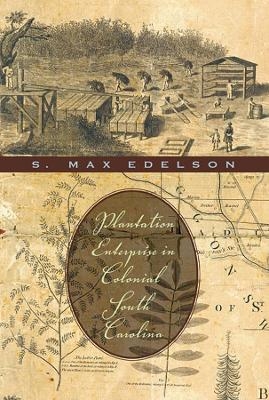
Plantation Enterprise in Colonial South Carolina
Harvard University Press (Verlag)
978-0-674-06022-7 (ISBN)
This impressive scholarly debut deftly reinterprets one of America's oldest symbols--the southern slave plantation. S. Max Edelson examines the relationships between planters, slaves, and the natural world they colonized to create the Carolina Lowcountry.
European settlers came to South Carolina in 1670 determined to possess an abundant wilderness. Over the course of a century, they settled highly adaptive rice and indigo plantations across a vast coastal plain. Forcing slaves to turn swampy wastelands into productive fields and to channel surging waters into elaborate irrigation systems, planters initiated a stunning economic transformation.
The result, Edelson reveals, was two interdependent plantation worlds. A rough rice frontier became a place of unremitting field labor. With the profits, planters made Charleston and its hinterland into a refined, diversified place to live. From urban townhouses and rural retreats, they ran multiple-plantation enterprises, looking to England for affirmation as agriculturists, gentlemen, and stakeholders in Britain's American empire. Offering a new vision of the Old South that was far from static, Edelson reveals the plantations of early South Carolina to have been dynamic instruments behind an expansive process of colonization.
With a bold interdisciplinary approach, Plantation Enterprise reconstructs the environmental, economic, and cultural changes that made the Carolina Lowcountry one of the most prosperous and repressive regions in the Atlantic world.
S. Max Edelson is Associate Professor of History at the University of Virginia.
Acknowledgments A Note on the Text Introduction 1. Laying Claim to the Land 2. Rice Culture Origins 3. Transforming the Plantation Landscape 4. City, Hinterland, and Frontier 5. Marketplace of Identity 6. Henry Laurens's Empire Conclusion: Into the American South Abbreviations Appendix: Statistical Tables Notes Index Illustrations The South Carolina Lowcountry-Frontispiece Figure 2.1. Inland swamp rice field Figure 3.1. Tidal swamp rice field Figure 3.2. A Lowcountry rice plantation Figure 4.1. An indigo plantation during the "making season" Figure 5.1. George Roupell, Peter Manigault and His Friends, c. 1750s Figure 6.1. Food exchanges on Henry Laurens's plantation enterprise, 1766-1773 Figure 6.2. John Singleton Copley, Henry Laurens, 1782 Map 4.1. Zones of settlement in the Lowcountry Map 4.2. Plantation settlement along the Cooper and Santee Rivers, c. 1785 Map 6.1. Henry Laurens's plantations, 1756-1792 Map 6.2. Rattray Green: Henry Laurens's Ansonborough compound, Charlestown, c. 1780
| Erscheint lt. Verlag | 14.6.2011 |
|---|---|
| Zusatzinfo | 6 halftones, 1 line illustration, 5 maps, 15 tables |
| Verlagsort | Cambridge, Mass |
| Sprache | englisch |
| Maße | 156 x 235 mm |
| Themenwelt | Geschichte ► Allgemeine Geschichte ► Neuzeit (bis 1918) |
| Geisteswissenschaften ► Geschichte ► Regional- / Ländergeschichte | |
| Geschichte ► Teilgebiete der Geschichte ► Wirtschaftsgeschichte | |
| Sozialwissenschaften ► Soziologie | |
| ISBN-10 | 0-674-06022-9 / 0674060229 |
| ISBN-13 | 978-0-674-06022-7 / 9780674060227 |
| Zustand | Neuware |
| Haben Sie eine Frage zum Produkt? |
aus dem Bereich


